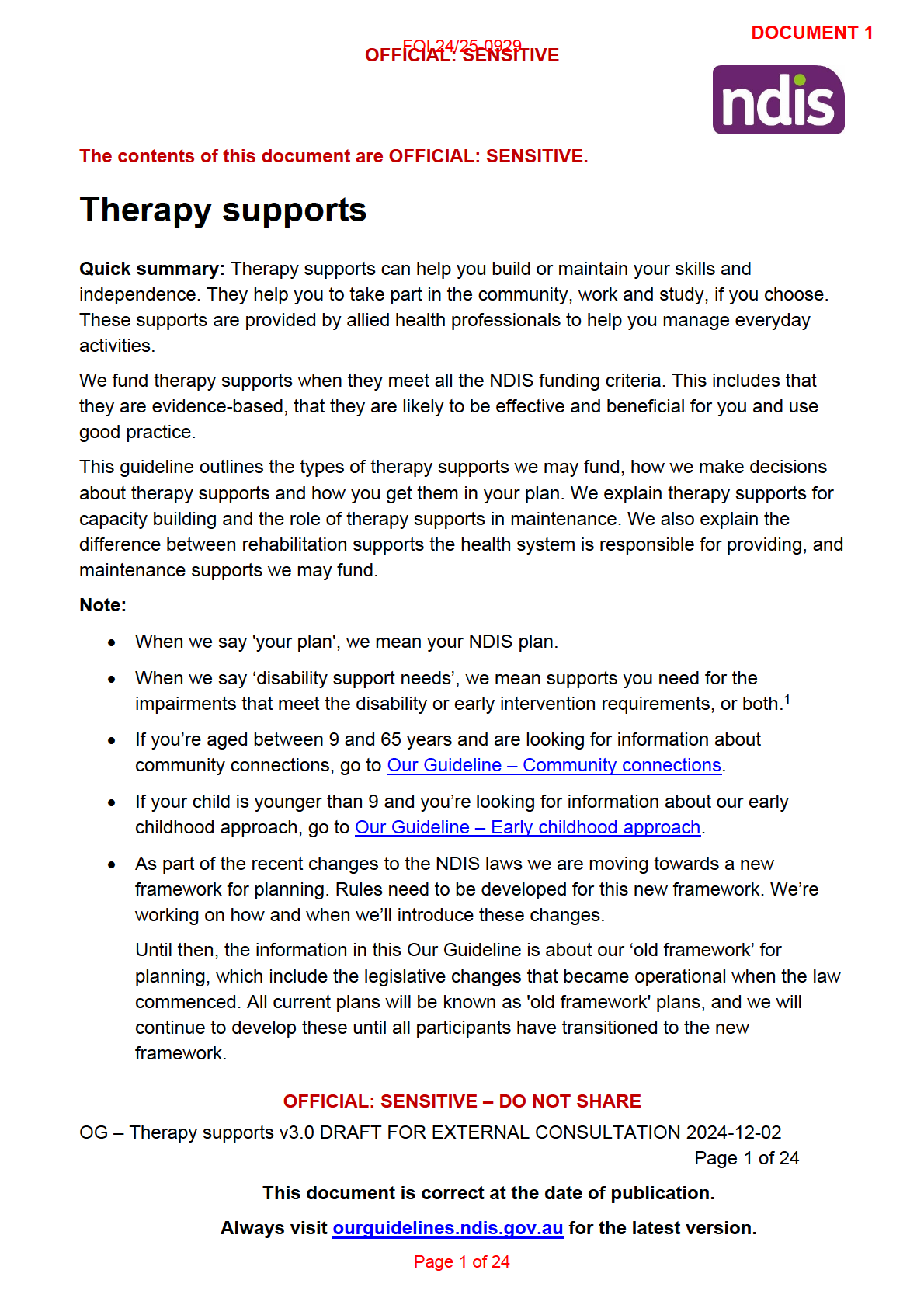
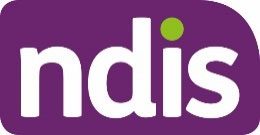 OFFICIAL: SENSIT
OFFICIAL: SENSIT
FOI 24/25-0929
IVE
What’s on this page?
This page covers:
What are therapy supports?
What information do we need to decide if we can fund therapy supports?
How do we make decisions about therapy supports?
How are therapy supports included in your plan?
What happens once you have therapy supports in your plan?
You might also be interested in:
Disability-related health supports
Nutrition supports including meal preparation
Podiatry and foot care supports
Dysphagia supports
Assistive technology
Home modifications
What are therapy supports?
Therapy supports can also be called therapeutic supports.2 They are supports you may need
because of your disability. These supports will help build your functional capacity and
independence. An allied health professional will work with you to give you specialised
therapy supports that meet your individual disability-related needs. They will also work with
you to help achieve your goals. This could be at home, in the community, at school and in
the workplace.
Therapy supports are evidence-based supports delivered by an appropriately qualified allied
health professional.
We fund NDIS supports that relate to your disability. NDIS supports are the services, items
and equipment that can be funded by the NDIS.3 Some examples of therapy supports we
may fund include:
audiology
supports
counselling
OFFICIAL: SENSITIVE – DO NOT SHARE
OG – Therapy supports v3.0 DRAFT FOR EXTERNAL CONSULTATION 2024-12-02
Page
2
of
24
This document is correct at the date of publication.
Always visit ourguidelines.ndis.gov.au for the latest version.
Page 2 of 24
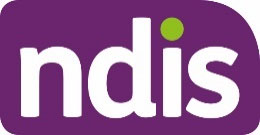 OFFICIAL: SENSIT
OFFICIAL: SENSIT
FOI 24/25-0929
IVE
dietary
supports
developmental
education
exercise
physiology
occupational
therapy
orientation and mobility support
orthoptics (help with specific eye conditions)
physiotherapy
podiatry
psychology
social
work
speech
pathology.
Therapy has many purposes. One of them is to help you build your functional capacity and
independence. When we say functional capacity, we mean the things you can and can’t do
because of your disability. Another purpose is to help you maintain your capacity or help
prevent your functional capacity from getting worse.
This could be help in areas such as:
mobility and movement
personal and social wellbeing
managing
nutrition
organising your daily life
communication
self-care
thinking skills and problem-solving
social
skills
moods and emotion
helping make your environment more accessible
vehicle modifications and driving assessments.
OFFICIAL: SENSITIVE – DO NOT SHARE
OG – Therapy supports v3.0 DRAFT FOR EXTERNAL CONSULTATION 2024-12-02
Page
3
of
24
This document is correct at the date of publication.
Always visit ourguidelines.ndis.gov.au for the latest version.
Page 3 of 24
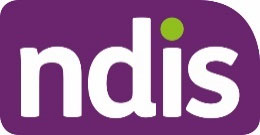 OFFICIAL: SENSIT
OFFICIAL: SENSIT
FOI 24/25-0929
IVE
There are many systems that work alongside the NDIS which provide supports and services.
We call these systems mainstream supports, and they are available to everyone across
Australia. You can talk with your doctor about what therapy supports you may be able to
access through mainstream services, such as the health system.
Your plan may include some therapy supports which are funded by us. If we’re responsible
for funding the support, it must meet all the NDIS funding criteria before it’s included in your
plan.
What are evidence-based therapy supports?
Evidence-based therapy uses current best practice evidence to make decisions about the
therapy supports delivered to you.
Best practice quality evidence is found in nationally and internationally endorsed and
published research and studies. It applies what is learnt to why and how the therapy
supports are delivered and how well they work to achieve the desired outcome. For us to
fund therapy, there needs to be a quality evidence base which demonstrates the therapy will
provide
disability related functional outcomes.
We can only fund a therapy support in your plan if it meets the NDIS funding criteria and
there is evidence that this will improve or maintain your functional capacity.
Animal-assisted therapy
Animal-assisted therapy is not the same as ‘animal therapy’. Animal-assisted therapists may
include an animal to play a role in a goal-directed, structured service which will assist you
and your therapist to engage in therapy. Animals can be therapy tools, just like a board
game, Lego, or a swing can be tools in a therapy session. For example, a psychologist may
include an animal in therapy sessions to assist you to calm, focus or regulate your emotions
during the therapy session. An occupational therapist may include an animal in therapy
sessions to assist you to participate in an activity such as walking, standing or balancing. In
these situations, the animal may be included by your therapist to help you meet specific
goals. The therapy is delivered to you by an allied health professional, and the animal is
there to support participation. The provider shouldn’t charge any extra fees for this service.
If you’re looking for information on Assistance animals, go to Our Guideline – Assistance
animals including dog guides.
Animal therapy
Activities provided for you to have a positive experience with an animal, such as engaging
with puppies, might be called animal therapy by some providers. Recreational, sporting, or
OFFICIAL: SENSITIVE – DO NOT SHARE
OG – Therapy supports v3.0 DRAFT FOR EXTERNAL CONSULTATION 2024-12-02
Page
4
of
24
This document is correct at the date of publication.
Always visit ourguidelines.ndis.gov.au for the latest version.
Page 4 of 24
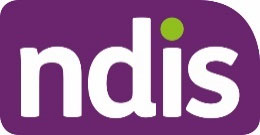 OFFICIAL: SENSIT
OFFICIAL: SENSIT
FOI 24/25-0929
IVE
social activities involving animals could also be called animal therapy. These activities are
not animal-assisted therapy services and aren’t NDIS supports, even if the provider of the
service is an allied health professional.
Example
Paul is on the autism spectrum and has asked for therapy supports to help him build his
skills in having conversations with his friends. He wants to work with a counsellor who
includes a therapy dog in their sessions. The therapy dog will help Paul relax and regulate
his emotions during therapy. This will help him talk with the counsellor without feeling so
anxious. Paul feels nervous about talking with a counsellor, especially about his friendships
and what skills he wants to focus on improving. He thinks by having a therapy dog in his
counselling sessions he will feel calmer.
We can fund therapy supports to help Paul increase his skills in areas his disability might
impact. For Paul, who has some difficulty with social communication, funding a counsellor to
work with him to improve his skills to make and keep friendships is reasonable and
necessary. It will also help him to increase his social communication skills. The counsellor
can include a therapy dog to help them work with Paul if they don’t charge him any additional
fees for using the dog.
Art and music therapy
Art therapy includes the use of art materials and can be delivered in different ways, like
through painting, drawing or modelling clay. Music therapy uses music in different ways,
including writing and playing music. Art therapy is delivered by an art therapist registered
with the Australian, New Zealand and Asian Creative Arts Therapies Association
(ANZACATA). Music therapy is delivered by a music therapist registered with the Australian
Music Therapy Association.
We can only fund art and music as a therapy support4 in your plan if it meets the NDIS
funding criteria and there is evidence that this will improve or maintain your functional
capacity.
If you have art or music therapy stated in your plan, you can access these supports as a
therapy support.
If art and music therapy is not stated in your plan, you can access art and music activities by
yourself or as a small group as part of your community and participation budget. This is
because while some people benefit from accessing these activities, there is limited evidence
about their benefit as a therapy support for most participants.
OFFICIAL: SENSITIVE – DO NOT SHARE
OG – Therapy supports v3.0 DRAFT FOR EXTERNAL CONSULTATION 2024-12-02
Page
5
of
24
This document is correct at the date of publication.
Always visit ourguidelines.ndis.gov.au for the latest version.
Page 5 of 24
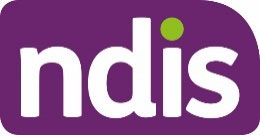 OFFICIAL: SENSIT
OFFICIAL: SENSIT
FOI 24/25-0929
IVE
For more information about claiming art and music therapy or activities, refer to the NDIS
Pricing Arrangements and Price Limits.
Massage therapy
Massage has to be provided by an allied health professional or a therapy assistant, for
disability-related needs, to meet the NDIS funding criteria.
Massage that’s provided to you by someone who isn’t an allied health professional is not an
NDIS support, including where it has been recommended by an allied health professional.
This includes remedial massage and general massages used for relaxation.
Where massage is part of your allied health therapy plan, it will be an NDIS support. Allied
health professionals write these plans to help build your ability to do things.
Therapy assistants, sometimes called allied health assistants, can work under the
supervision of an allied health professional. They help deliver therapy plans developed by
your allied health professional.
Massage therapists who work with allied health professionals are not allied health assistants,
so we can’t fund them.
What are capacity building therapy supports?
Capacity building therapy supports aim to build your skills and independence. They can help
you do everyday activities, in the home, community, at school and at work. Capacity building
therapy supports will have specific goals and outcomes, together with a timeframe to achieve
the goals. They may be required for a short time or a longer time, depending on your
individual situation. For example, you may work with an occupational therapist to help you to
manage your daily household chores and work towards your goal of being able to do them
more independently. As your capacity and independence grow, it’s likely you will need less
capacity building therapy supports over time.5 To learn more about support budgets, go to
Support budgets in your plan.
Different tools can be used by allied health professionals to support goal-directed, structured
therapies. Art, music or animals can be tools used in a therapy session. For example, an
occupational therapist may include art or music in therapy sessions to assist you to develop
your fine motor skills. Animals might be used to help calm you, focus or regulate your
emotions during a therapy session. These therapies have to be delivered to you by an allied
health professional with art, music or animals as a tool to support improving or maintaining
your functional capacity. A provider shouldn’t charge any extra fees for this service.
OFFICIAL: SENSITIVE – DO NOT SHARE
OG – Therapy supports v3.0 DRAFT FOR EXTERNAL CONSULTATION 2024-12-02
Page
6
of
24
This document is correct at the date of publication.
Always visit ourguidelines.ndis.gov.au for the latest version.
Page 6 of 24
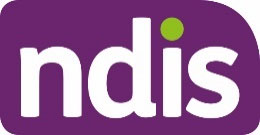 OFFICIAL: SENSIT
OFFICIAL: SENSIT
FOI 24/25-0929
IVE
Capacity building therapy supports may be needed at different times or stages in your life.
This might be at a developmental stage or after a recent diagnosis, for example,
Huntington’s disease. It may also include a change in situation, or where you want to learn a
new skill, for example, learning to catch a bus.
Some family members, carers, support workers and community organisations may need
training to help you do everyday activities. For example, we may fund an occupational
therapist to train your family members how to safely use your support equipment, such as a
chair lift.
When you have a recent diagnosis or change in your skills or function, you may need time-
limited capacity building therapy supports before transitioning to maintenance supports.
Time-limited supports are a burst of therapy to learn or achieve a new therapy goal.
Maintenance therapy is aimed at preventing or slowing decline in function. For example,
stretching programs to stop someone with spasticity from losing a range of movement.
Maintenance therapy programs are set up by therapists, and delivered by a range of people,
for example a therapy assistant.
When asking for funding for capacity building therapy supports, you need to give us an
assessment or report from your allied health professional. This report should include
recommendations for supports you need and the reasons you need them. It also needs to
include how your informal, mainstream or community supports will help you pursue your
goals.
If you need capacity building therapy supports, your therapist will assess your support needs
and develop a therapy plan or program for you. Your therapy plan or program needs to have
goals that can be measured. It also needs to include strategies and recommended supports
to help you build your skills and increase your family or carer’s skills. Capacity building
therapy supports can also be used to support you to move through different life stages or
transitions in your life. For example, if you’re leaving school or moving out of your family
home. Your therapist will send us progress reports to let us know how the therapy supports
are working for you.
Example
Shae is 21 and lives at home with her family. Shae lives with Down Syndrome. She needs
support with some everyday tasks because of her disability. Shae wants to develop self-care
skills so she can get ready on her own before work.
Shae uses her NDIS supports to work with an occupational therapist. Shae and her
occupational therapist develop a plan to help Shae learn self-care skills and build her
OFFICIAL: SENSITIVE – DO NOT SHARE
OG – Therapy supports v3.0 DRAFT FOR EXTERNAL CONSULTATION 2024-12-02
Page
7
of
24
This document is correct at the date of publication.
Always visit ourguidelines.ndis.gov.au for the latest version.
Page 7 of 24
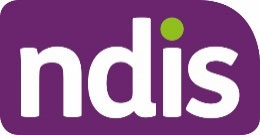 OFFICIAL: SENSIT
OFFICIAL: SENSIT
FOI 24/25-0929
IVE
independence to get ready for work. Shae’s occupational therapist explains the management
plan to Shae, her family, and her support workers. Shae’s parents and support workers help
Shae follow the plan.
Shae’s current plan includes meeting with her occupational therapist every 4 weeks for the
next 6 months. This is to make sure the supports and strategies are effective in helping her
build her independence. Shae can check in sooner if she has any questions or needs more
help. At each check-in Shae and her occupational therapist will work out what future
supports Shae may need and give us a progress report.
Capacity building therapy supports for children
This guideline outlines how we make decisions about therapy supports for children who are
aged 9 years and older.
Therapy supports are provided as part of early childhood supports for children younger than
9. Learn more about our early childhood approach in Our Guideline – Early childhood
approach.
Example
Stephanie is 13 years old and is on the autism spectrum. She lives at home with her mother.
Stephanie is starting high school next year and wants to learn how to be more organised and
prepare herself for school.
Stephanie uses the NDIS supports in her plan to work with an occupational therapist.
Stephanie, her mother, and her occupational therapist develop a therapy plan. The
strategies in the plan will help her learn self-care skills, planning and organisational skills,
and increase her independence to get ready for school. Stephanie’s occupational therapist
explains the therapy plan to Stephanie and her mother so they can follow the plan.
Stephanie can also provide a copy of the plan to her school as part of her individual learning
plan.
Stephanie’s current plan includes meeting with her occupational therapist every 2 weeks for
the next 3 months. This is to make sure the supports and strategies are effective in helping
her build her independence and pursue her goals. Her occupational therapist will also work
out what future supports Stephanie may need and give us a progress report.
What if your child has been getting early childhood supports and is turning 9?
Our early childhood approach applies to children younger than 9. Learn more about our early
childhood approach in Our Guideline – Early childhood approach.
OFFICIAL: SENSITIVE – DO NOT SHARE
OG – Therapy supports v3.0 DRAFT FOR EXTERNAL CONSULTATION 2024-12-02
Page
8
of
24
This document is correct at the date of publication.
Always visit ourguidelines.ndis.gov.au for the latest version.
Page 8 of 24
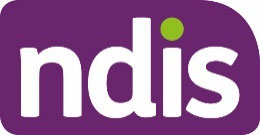 OFFICIAL: SENSIT
OFFICIAL: SENSIT
FOI 24/25-0929
IVE
If your child has been getting early childhood supports as part of their plan before they turn
9, they may transition to other types of capacity building supports, including therapy supports
when their plan is reassessed.
Early childhood supports use best practice approaches and are generally provided by a team
of early childhood professionals working together through a key worker approach. When
your child turns 9, the way the NDIS funds therapy is different, and it may mean your child’s
plan includes individual therapy supports rather than a team approach. Therapy supports
aim to continue to support your child to take part in daily activities in the home, community
and at school.
The aim of NDIS supports is to work alongside other supports provided by mainstream
services, such as the education system. Each state and territory education system is
responsible for providing support to all students across Australia. Your child’s disability-
related support needs will change as they become more independent, for example, when
they have settled into school. Your child’s school will provide some of the supports they
need, with a focus on their learning requirements and assisting them to participate in school
life. Learn more about mainstream and community supports.
Not all early childhood professionals continue to provide services to children older than 9.
This means you may need to find new providers if your child has therapy supports included
in their plan. If your early childhood professional can’t continue to support your child, they
can help you find another allied health professional who can provide therapy supports. They
can share a copy of the therapy plan with your new allied health professional. You can also
talk to your my NDIS contact or support coordinator.
To find NDIS registered providers, you can search the Provider Finder or when you are on
the myplace portal.
As your child’s independence and participation grow, it’s possible their capacity building
therapy supports will reduce over time. We’ll check in with you about any changes to your
child’s disability-related support needs as they grow and develop.
What are maintenance supports?
You may need maintenance supports to help you maintain your current functional capacity,
achieve small gains over time, or prevent your functional capacity getting worse. Sometimes,
following rehabilitation, you may need maintenance supports. Some people may need
ongoing maintenance supports, for example, if you have a condition that is unlikely to
change or will get worse over time.
OFFICIAL: SENSITIVE – DO NOT SHARE
OG – Therapy supports v3.0 DRAFT FOR EXTERNAL CONSULTATION 2024-12-02
Page
9
of
24
This document is correct at the date of publication.
Always visit ourguidelines.ndis.gov.au for the latest version.
Page 9 of 24
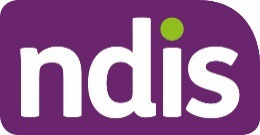 OFFICIAL: SENSIT
OFFICIAL: SENSIT
FOI 24/25-0929
IVE
Maintenance supports can assist you in daily living activities, help prevent the loss of your
functional capacity and support the gains you made during your rehabilitation. For example,
they can include assistive technology, therapy supports, support to access the community, or
personal care support.
The aim of maintenance supports is to help you maintain your functional capacity and work
towards long-term participation and community living goals. It’s also to help you adapt to
your disability or functional impairment.
Requests for funding of maintenance support should be accompanied by an assessment or
report that includes recommendations of supports from your therapist. It should also include
how you will be linked to additional informal, mainstream or community supports to help you
work towards your goals. This may include supports provided through the health system.
If you need maintenance supports, your therapist will assess your support needs and
develop a maintenance plan or program for you. Your plan or program will have strategies
and recommended supports to help you maintain the things you can do. Your therapist will
teach you how to complete your maintenance program and will review it regularly to make
sure it is still working. Your therapist will send us progress reports to let us know how the
maintenance supports are working for you.
If you need someone to help you with your maintenance supports your therapist can train
your family or carers to help you implement these strategies as part of your day-to-day life.
In some situations, you may need a therapy assistant to provide support to implement your
maintenance program. This is called a delegated model. In a delegated model, it’s important
that a qualified therapist oversees your program and reviews it regularly to make sure it
meets your needs.
Example
Ahmed is 45 years old and lives alone. He has low vision in both eyes. He needs therapy
supports to help him adapt to his functional impairments. He also needs help to identify
supports he may need to access the community, for personal activities and to monitor his
support needs. Ahmed works part time, likes to meet up with his friends once a week and
enjoys doing his own grocery shopping.
Ahmed uses his NDIS supports for an occupational therapist to review his daily living
activities and assess his support needs. He also uses his funding for an orientation and
mobility specialist to help him adapt and learn to get around at home and in the community.
Ahmed’s occupational therapist and orientation and mobility specialist work with him to
OFFICIAL: SENSITIVE – DO NOT SHARE
OG – Therapy supports v3.0 DRAFT FOR EXTERNAL CONSULTATION 2024-12-02
Page
10
of
24
This document is correct at the date of publication.
Always visit ourguidelines.ndis.gov.au for the latest version.
Page 10 of 24
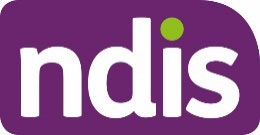 OFFICIAL: SENSIT
OFFICIAL: SENSIT
FOI 24/25-0929
IVE
develop therapy plans. These plans include strategies and equipment that will help him with
his daily tasks and activities and meet his support needs.
Ahmed needs maintenance therapy to adapt to new environments, such as visiting a
restaurant with friends. His occupational therapist also identifies that Ahmed will require
support to access the community in some situations, such as new environments and that this
is more than is reasonable to expect his informal supports to provide.
Ahmed’s therapists will continue to monitor his support needs and adjust his maintenance
plan as needed. It’s likely Ahmed won’t need his orientation and mobility specialist after he’s
adapted to his functional impairments and has the equipment he needs. He will need
ongoing support from his occupational therapist to monitor his maintenance plan and support
needs.
What maintenance therapy supports can I get following rehabilitation?
After some injuries, illnesses, and life events, you might need an intensive period of
rehabilitation to help you get back to doing things more independently. These injuries or
illnesses will likely also need long-term care and disability support including maintenance
supports. We call these injuries severe or catastrophic injuries which include Parkinson’s
Disease, acquired brain injury, amputation, or a stroke.
The health system is responsible for providing treatment and rehabilitation to all Australians.6
The NDIS works alongside these services and is not meant to replace supports provided by
these systems. If you’re eligible for the NDIS and need ongoing disability or maintenance
support following your rehabilitation, we’ll work with you and your healthcare team.
The mainstream health system can provide your rehabilitation in a hospital or community
setting, for example in a community rehabilitation centre or your home. The aim of
rehabilitation is to work with you to recover and get back as much functional independence
as possible. Rehabilitation is to help you adapt to the disability you have because of your
impairment.
Mainstream health systems will help you set goals for your rehabilitation and provide the
rehabilitation and treatment you need. They’ll create a healthcare plan which includes your
rehabilitation goals. This plan is usually time limited.
You may need maintenance supports if your functional capacity is still substantially reduced
after you’ve reached your rehabilitation goals. We’re responsible for funding reasonable and
necessary maintenance supports after you have finished your rehabilitation.7 We may fund
maintenance supports for you following your discharge from hospital. NDIS supports aren’t
OFFICIAL: SENSITIVE – DO NOT SHARE
OG – Therapy supports v3.0 DRAFT FOR EXTERNAL CONSULTATION 2024-12-02
Page
11
of
24
This document is correct at the date of publication.
Always visit ourguidelines.ndis.gov.au for the latest version.
Page 11 of 24
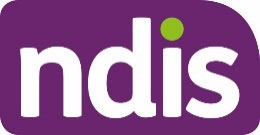 OFFICIAL: SENSIT
OFFICIAL: SENSIT
FOI 24/25-0929
IVE
meant to replace supports provided by the health system. Talk to your healthcare team first
to see what supports they can provide for you.
When we make decisions about maintenance supports following rehabilitation, we work
closely with you and your healthcare team. This helps us understand your permanent
impairments and functional capacity.
We’ll make sure you have an NDIS plan as part of your discharge plan from hospital. We’ll
work with you to create your NDIS plan that includes your life goals, and the ongoing
disability and maintenance supports you may need.8
Learn more about creating your plan.
There may be times in the future where you need more rehabilitation sessions. This could be
to help improve your recovery and address a specific functional goal. The mainstream health
system will provide and fund these. You’ll need to set your rehabilitation goals again for the
required time period.9
Your NDIS plan can continue while this is happening. We’ll work with you and your
rehabilitation health service to make sure you get any reasonable and necessary disability-
related supports you need during these extra periods of rehabilitation.
Learn more about maintenance supports and the responsibilities of the NDIS and other
service systems.
Example
Trey is 37 years old. Trey had a fall a year ago that caused a spinal cord injury. He had
treatment for his injury followed by rehabilitation in hospital for 10 months. The hospital
occupational therapist did an assessment of Trey’s home before he left hospital. During his
rehabilitation, he applied for NDIS disability-related supports for when he got back home. He
now lives with his sister and has a goal to be able to work from home.
Once Trey achieved his rehabilitation goals, he needed maintenance supports to help him
with everyday tasks and activities at home. Maintenance supports will help Trey keep the
gains he got from rehabilitation. They will help prevent any decline in his mobility and
movement and help him work towards his life goals.
Trey uses his NDIS supports for an occupational therapist and physiotherapist. Trey’s
occupational therapist develops a transfer and position plan for him to reduce the risk of falls
and pressure injuries. This plan includes regular training for support workers and Trey's
sister. His occupational therapist also reviews his daily activities to identify strategies and
OFFICIAL: SENSITIVE – DO NOT SHARE
OG – Therapy supports v3.0 DRAFT FOR EXTERNAL CONSULTATION 2024-12-02
Page
12
of
24
This document is correct at the date of publication.
Always visit ourguidelines.ndis.gov.au for the latest version.
Page 12 of 24
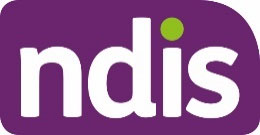 OFFICIAL: SENSIT
OFFICIAL: SENSIT
FOI 24/25-0929
IVE
equipment to help him with showering, dressing, and preparing meals. His physiotherapist
develops a program to help him maintain his mobility and movement.
Trey’s therapy supports have helped him maintain his movement and mobility. He’ll continue
to need maintenance supports in the future to help him maintain his mobility and work
towards his goal of working from home.
His occupational therapist and physiotherapist will review and update Trey’s maintenance
plan and adjust it to meet his support needs. They will complete progress reports with Trey’s
goals for the therapy and the outcomes achieved. As he makes progress towards his goals,
he may need less support, or his support needs may change.
Who can provide therapy supports?
Therapy supports can only be provided by an appropriately qualified allied health
professional. They need to be appropriately qualified and hold registration or membership
with their professional body. They can assess and diagnose your therapy support needs.
Read more about professionals who can deliver therapy supports in the NDIS Pricing
Arrangements and Price Limits. Your therapy providers must follow the NDIS Code of
Conduct, and if they’re NDIS registered providers, they must also follow the NDIS Practice
Standards.
Your allied health professional will work with you to give you specialised therapy supports
that meet your individual disability-related needs.
Allied health professionals can help you to:
develop skills and abilities that help you get better at doing usual activities in your
daily life
increase your ability to do things independently
improve your participation in activities when you’re out in social settings and in the
community, or work and study.
Depending on your needs and goals, you might get therapy supports from more than one
allied health professional at the same time. For example, you might be starting a job. You
may need an occupational therapist to help you improve your skills to travel to new places
and manage the changes in your life. You may also need a speech pathologist to help build
your social and communication skills so you can communicate confidently with others. It may
be important for your therapists to work together, so they can coordinate the therapy
OFFICIAL: SENSITIVE – DO NOT SHARE
OG – Therapy supports v3.0 DRAFT FOR EXTERNAL CONSULTATION 2024-12-02
Page
13
of
24
This document is correct at the date of publication.
Always visit ourguidelines.ndis.gov.au for the latest version.
Page 13 of 24
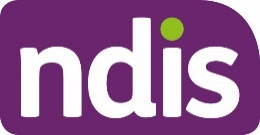 OFFICIAL: SENSIT
OFFICIAL: SENSIT
FOI 24/25-0929
IVE
supports they provide to get the best outcomes for you. Talk to your allied health
professionals if you want more coordination of your therapies.
Some allied health professionals can help with assessing if you need assistive technology or
home modifications because of your disability. They will work with you to see which assistive
technology or home modification you may need that will best help you with your daily
activities. If you need it, they can also train you and the people who support you to use the
assistive technology.
Therapy assistants, sometimes called allied health assistants, can work through a delegated
model, under the supervision of an allied health professional. They can help you with the
therapy programs developed by your allied health professionals.
Usually when we fund a therapy assistant, we expect that the allied health professional will
provide less frequent sessions. You can use your therapy budget flexibly for a combination
of allied health therapy. This may include a therapy assistant, if your allied health
professional agrees this is appropriate for you.
Types of allied health professionals
Here are some examples and brief descriptions of different types of allied health
professionals who can support you. The descriptions will help you understand what they do
and the supports they may offer.
These descriptions are general and include therapy supports we may fund as well as those
provided by other systems such as the health system. These services are called mainstream
services.10
We can only include therapy supports in your plan if they are reasonable and necessary to
support you to pursue your goals. Any supports we fund must meet all the NDIS reasonable
and necessary criteria.
When we describe the different therapies, we’ve included any associations the allied health
professional must be part of and what the therapy might help you to achieve. All therapy
supports we fund must be directly related to your disability support needs.11 We fund NDIS
supports that relate to your disability. NDIS supports are the services, items and equipment
that can be funded by the NDIS12. Some therapies are most effective as part of a
multidisciplinary programme.
Audiologists
Audiologists are experts in hearing loss. Audiologists can help you at any age if you’re
experiencing hearing loss. This can be with the use of hearing aids and other assistive
OFFICIAL: SENSITIVE – DO NOT SHARE
OG – Therapy supports v3.0 DRAFT FOR EXTERNAL CONSULTATION 2024-12-02
Page
14
of
24
This document is correct at the date of publication.
Always visit ourguidelines.ndis.gov.au for the latest version.
Page 14 of 24
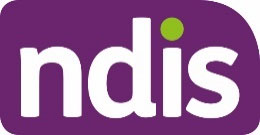 OFFICIAL: SENSIT
OFFICIAL: SENSIT
FOI 24/25-0929
IVE
technologies to improve your ability to communicate. Audiologists must be either currently
certified as an Audiology Australia Accredited Audiologist by Audiology Australia or as a Full
Member as an audiologist with the Australian College of Audiology.
Counsellor
Counsellors can help you with evidence-based psychosocial support. For example, they can
support someone to mentally and emotionally adapt to a new disability diagnosis. A
counsellor must be either a member of the Australian Counselling Association or an
accredited Registrant with the Psychotherapy and Counselling Federation of Australia.
Developmental educators
Developmental educators have expertise in working with you if you have developmental or
acquired disabilities. They can support you to foster skills, independence, and quality of life.
Developmental educators can also implement strategies from other therapists with children
under the age of 18. Developmental educators must be a Full Member of Developmental
Educators Australia Incorporated.
Dietitian
Dietitians support you to maintain or improve your health and wellbeing through nutrition and
dietetics. Dietitians give evidence-based nutrition services, dietary counselling, and therapy.
For example, developing a meal plan for a person with cerebral palsy who is underweight.
The meal plan will help make sure they receive their nutritional needs and consume
adequate nutrients to keep healthy. Dietitians must be an Accredited Practising Dietitian with
Dietitians Australia.
To learn more about disability related dietary supports, see Our Guideline – Nutrition
supports including meal preparation.
Exercise physiologist
Exercise physiologists can assess you if you have an existing medical condition or injury or
are at risk of developing one. They can also support conditions that result from disability.
Exercise physiologists use exercise-based therapies that may include teaching you about
muscle strength and physical activity related to your disability. We don’t fund exercise
physiology for general fitness or weight loss. For example, an exercise physiologist can
assist a person with multiple sclerosis who uses a walker to maintain muscle strength and
independence. This could mean they don’t need a support worker to assist them but can
move about independently. Exercise Physiologists must be an Accredited exercise
physiologist with Exercise and Sports Science Australia.
OFFICIAL: SENSITIVE – DO NOT SHARE
OG – Therapy supports v3.0 DRAFT FOR EXTERNAL CONSULTATION 2024-12-02
Page
15
of
24
This document is correct at the date of publication.
Always visit ourguidelines.ndis.gov.au for the latest version.
Page 15 of 24
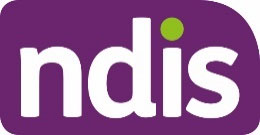 OFFICIAL: SENSIT
OFFICIAL: SENSIT
FOI 24/25-0929
IVE
Occupational therapist
Occupational therapists work with you to teach you how to be as independent as possible
when you do everyday tasks. They support you to build knowledge and skills, find new ways
of doing things, and manage change. Occupational therapists can also assess where you
live, the places you visit and recommend any adjustments to meet your disability support
needs. For example, assistive technology or home modifications to help you safely get
around and do things. Occupational therapists must have a current Australian Health
Practitioner Regulation Agency (AHPRA) Registration as an Occupational Therapist.
Orientation and mobility specialist
Orientation and mobility specialists work with you if you’re blind or have low vision. They help
you learn skills that enable you to move as independently as possible in indoor and outdoor
environments. They can teach you about supports you may need, for example, assistive
technology, to help you move around. Orientation and mobility specialists must have current
registration with the Orientation and Mobility Association of Australasia.
Orthoptist
Orthoptists work with you if you have vision loss due to an eye or neurological condition that
causes difficulty understanding what you see. Orthoptists can teach you about how your
vision works and help improve how you optimise your vision. They can teach you about what
supports you may need, for example, assistive technology, to help you improve your
functional vision for everyday activities. Orthoptists must have current registration with the
Australian Orthoptic Board.
Physiotherapist
Physiotherapists assess, diagnose, manage, and prevent a wide range of health conditions
and movement and neurological disorders. They help reduce stiffness and pain and increase
mobility. Physiotherapists can help manage muscular conditions which occur because of
your disability. They can also help you look at assistive technology that you might need.
Physiotherapists must have current AHPRA Registration as a Physiotherapist.
Podiatrist
Podiatrists assess, diagnose, and manage conditions of the feet, ankles, and legs. A
podiatrist may prescribe foot orthoses because of muscle weakness or tightness. Podiatrists
can develop a podiatry care plan that will outline how you or someone else can help you
manage your disability-related foot care. Podiatrists must have current AHPRA Registration
as a Podiatrist.
OFFICIAL: SENSITIVE – DO NOT SHARE
OG – Therapy supports v3.0 DRAFT FOR EXTERNAL CONSULTATION 2024-12-02
Page
16
of
24
This document is correct at the date of publication.
Always visit ourguidelines.ndis.gov.au for the latest version.
Page 16 of 24
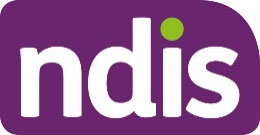 OFFICIAL: SENSIT
OFFICIAL: SENSIT
FOI 24/25-0929
IVE
Learn more about podiatry as a support.
Prosthetist and orthotist
Prosthetists/orthotists assess and address the physical and functional limitations caused by
illnesses and/or disabilities, including limb amputations. They can prescribe, design, fit, and
monitor prostheses or orthoses to meet your disability-related therapy support needs.
The easiest way to explain the difference between a prosthetist and an orthotist is:
a
prosthetist works with devices designed to
replace a limb, or another part of
the body
an
orthotist works with devices designed to
support a limb or another part of the
body.
Prosthetists and Orthotists must have current registration with the Australian Orthotic
Prosthetic Association (AOPA).
Psychologist
Psychologists work with you, and often your family, to help you make desired changes to
behaviours. For example, they can help you to improve the way you engage in relationships
or provide strategies to help you to better manage your mental health. They can also help
you to develop individual strategies to manage your emotions and adjust to changes in your
life because of your disability. Psychologists must have current AHPRA Registration as a
Psychologist.
If you need support from a psychologist for treatment, including as part of a recovery
programme, this would be the responsibility of the health system and not the NDIS.
Note: If you have behaviours of concern, you may require behaviour support instead of or as
well as psychology supports.
Social worker
Social workers focus on maintaining and maximising quality of life for people living with
disability. Social workers use a holistic approach to understand how your individual factors
and social environment might impact your therapy. For example, social workers may support
you with individual, family and group work, strategies to adjust to disability and associated
lifestyle changes. They can help you deal with emotional aspects of life transitions. Social
Workers must be a member of the Australian Association of Social Workers.
Speech pathologist
OFFICIAL: SENSITIVE – DO NOT SHARE
OG – Therapy supports v3.0 DRAFT FOR EXTERNAL CONSULTATION 2024-12-02
Page
17
of
24
This document is correct at the date of publication.
Always visit ourguidelines.ndis.gov.au for the latest version.
Page 17 of 24
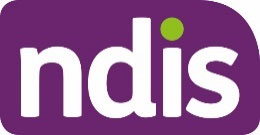 OFFICIAL: SENSIT
OFFICIAL: SENSIT
FOI 24/25-0929
IVE
Speech pathologists diagnose and address communication disabilities. A communication
disorder is when you have difficulty receiving, sending, processing, or understanding verbal,
non-verbal and picture or graphic symbols. For example, they can support you if you have
difficulties with speaking, listening, or hearing, understanding language, learning, social
skills, or swallowing.
They work with you to help improve communication using verbal speech, or through assistive
technology. Augmentative and Alternative Communication can include low technology
options such as picture cards or basic signs. It can also include high technology systems
such as iPads with communication apps or speech generating devices with switch or eye
gaze access. Speech pathologists must be a Certified Practising Speech Pathologist (CPSP)
as approved by Speech Pathology Australia.
To learn more about how they can help with swallowing difficulties, see Our Guideline -
Dysphagia supports.
Therapy assistant
A person who is not one of the types of allied health professionals listed above but who the
provider considers to be an appropriate professional to deliver therapy supports in line with
the NDIS Quality and Safeguarding Commission’s requirements for the Therapeutic
Supports Registration Group.13 For example, allied health professional (AHP) students or
provisional psychologists on clinical placement can provide services to you, provided they
are under the supervision of a qualified AHP when delivering the services, and you have
agreed that the student may deliver specific aspects of the support.
The service agreement between you and your provider should document this consent, and
how the arrangement can result in additional flexibility for you. For example, lower hourly
rate or additional hours of service.
What information do we need to decide if we can fund
therapy supports?
For us to make a decision about funding therapy supports, we must make sure they meet
both your disability-related support needs and the NDIS funding criteria.14
You’ll need to give us information to help us understand your support needs. Your allied
health professional can also give us evidence. Sometimes we will ask that they provide us
with evidence.
OFFICIAL: SENSITIVE – DO NOT SHARE
OG – Therapy supports v3.0 DRAFT FOR EXTERNAL CONSULTATION 2024-12-02
Page
18
of
24
This document is correct at the date of publication.
Always visit ourguidelines.ndis.gov.au for the latest version.
Page 18 of 24
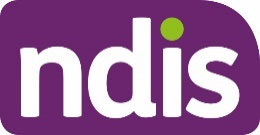 OFFICIAL: SENSIT
OFFICIAL: SENSIT
FOI 24/25-0929
IVE
If you need assistive technology, home modifications or vehicle modifications, your allied
health professional should use our assistive technology assessment templates when
required. They can also provide the same information in a letter of recommendation and
submit it as part of your evidence.
These may include:
information from you about your lived experience and support needs
evidence from assessments and quotations
evidence in reports
evidence in progress reports.
If you’re already getting therapy supports, we’ll ask your allied health professional for a
progress report.
A progress report should include:
a summary of the supports you’re getting
evidence of previous therapies you’ve had, and the outcomes achieved
your lived experience of how therapy supports have helped you with your disability
in the past15
how the support has helped you pursue your goals
how the support has helped you increase or maintain your independence
the measurable functional gains you’ve made since receiving therapy supports
if relevant, details of how your therapy supports are being coordinated with other
allied health professionals
how you’ve been linked to additional informal, community or mainstream supports
to help you take part in social, work or study activities
any barriers to using your supports or getting them provided, and how these have
been resolved
any risks to you or others
evidence-based
recommendations.
If you haven’t had therapy supports before, it may be helpful for you to give us information16
from your treating health professional about:
OFFICIAL: SENSITIVE – DO NOT SHARE
OG – Therapy supports v3.0 DRAFT FOR EXTERNAL CONSULTATION 2024-12-02
Page
19
of
24
This document is correct at the date of publication.
Always visit ourguidelines.ndis.gov.au for the latest version.
Page 19 of 24
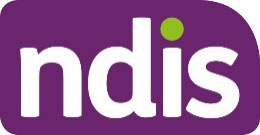 OFFICIAL: SENSIT
OFFICIAL: SENSIT
FOI 24/25-0929
IVE
the type of therapy support you need and why you need it
the therapy approach that will be used and who might provide it
what outcome the support aims to give you
how long and how often you’ll need the support to achieve the expected outcome
evidence of previous treatments you’ve had and what the results were.
You can send us this information at xxxxxxxxx@xxxx.xxx.xx.
Sometimes we need more information to help us decide if your request for therapy supports
meets the NDIS funding criteria. If we do, we may ask you to have an assessment and give
us a report.17
If we ask you to have an assessment, we’ll include funding in your plan to pay for the
assessment and report from your therapist. We’ll let you know the information we need in the
assessment.
For example:
how your informal, community and mainstream supports will help you to pursue
your goals
how the therapy support will increase your independence
how the therapy support will help you pursue your goals and take part in your
community, work, and study
how your gains or expected outcomes will be measured, including how long you
will need to achieve the outcome of the therapy support
the NDIS contact person to forward the information to.
If you need help getting the evidence, or you’re not sure what evidence is needed talk to
your my NDIS contact.
Go to What happens in your planning conversation to learn what information we need prior
to your planning meeting.
How do we make decisions about therapy supports?
Once we’ve identified what therapy supports you need, and decided they meet the NDIS
funding criteria, we can include funding for the NDIS support in your plan.
OFFICIAL: SENSITIVE – DO NOT SHARE
OG – Therapy supports v3.0 DRAFT FOR EXTERNAL CONSULTATION 2024-12-02
Page
20
of
24
This document is correct at the date of publication.
Always visit ourguidelines.ndis.gov.au for the latest version.
Page 20 of 24
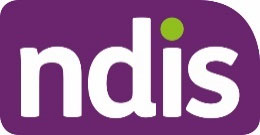 OFFICIAL: SENSIT
OFFICIAL: SENSIT
FOI 24/25-0929
IVE
When we decide what therapy supports we may fund, we also think about the principles we
follow to create your plan.
We can only include supports in your plan if they meet all the reasonable and necessary
criteria. This means that before we can include a funded support in your plan, we need to be
satisfied it meets all the following criteria:
The support is for the impairments you meet the disability or early intervention
requirements for, or both.
The support will help you to pursue your goals in your plan.
The support will help you to undertake activities, to facilitate your social and economic
participation. This means the support will help you join in social outings, recreation,
work, and study by reducing the disability-related barriers that prevent you from
participating.
The support represents value for money. This means we need to consider the costs
and benefits of the support, as well as the costs and benefits of alternative supports.
The support will be, or is likely to be, effective and beneficial for you, having regard to
current good practice. This means we consider if there is evidence the support works
for someone with similar disability support needs. We won’t need an expert report for
every support, as we can often rely on other information or evidence. For example, we
may have information already about whether the support is widely accepted to suit
someone with your disability support needs. We also look at your lived experience.
The funding of the support takes account of what it is reasonable to expect families,
carers, informal networks and the community to provide. This means we need to
consider what support is reasonable for your family, friends, and community to
provide.
The
support
is an NDIS support for you.
We also think about what help is reasonable to expect from others in your life18. This could
be help from family, friends, unpaid carers, and the community.
There are many systems that work alongside the NDIS, which provide supports and
services. We call these systems mainstream supports. These are supports that are available
to everyone across Australia, whether or not they have a disability.
When making a reasonable and necessary decision about what therapy supports to include
in your plan, we also use the following information:
OFFICIAL: SENSITIVE – DO NOT SHARE
OG – Therapy supports v3.0 DRAFT FOR EXTERNAL CONSULTATION 2024-12-02
Page
21
of
24
This document is correct at the date of publication.
Always visit ourguidelines.ndis.gov.au for the latest version.
Page 21 of 24
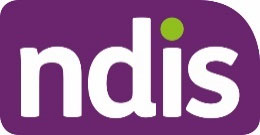 OFFICIAL: SENSIT
OFFICIAL: SENSIT
FOI 24/25-0929
IVE
your lived experience with how therapy supports work for you
assessments
reports
published evidence about the therapy supports such as research journal articles.
We look at whether you have the same therapy goals with different therapists. For
example, a physiotherapist and an exercise physiologist may work on different parts of
mobility. The physiotherapist may help you with your balance when walking while the
exercise physiologist may help you build muscle strength and endurance. We won’t fund
two therapists to work on the same goal.
We think about which therapy supports you may need to help you become more
independent and improve or maintain your functional capacity.
You can learn more about the NDIS funding criteria in Our Guideline – Reasonable and
necessary supports.
To learn more about the type of information we need, go to What information do we need to
decide if we can fund therapy supports?
If we decide some or all the therapy supports recommended in the evidence you provide
don’t meet the NDIS funding criteria, we can’t include them in your plan. We’ll give you
written notice and the reasons for our decision19 about the supports we have or haven’t
included in your plan. This decision is a reviewable decision, which means if you don’t agree
with our decision, you can ask us to review it.
How are therapy supports included in your plan?
Once we have all the information and evidence we need, we’ll make a decision about
funding therapy supports in your plan. If they meet the NDIS funding criteria, we’ll include the
funding for therapy supports in your NDIS plan.
Sometimes we might describe therapy supports as a stated support. This is when we
describe the support specifically.20 This means you must use your funding for the support in
the way we have described in your plan.21 For example, we might specify the type of therapy
or the amount of sessions in one time period. Learn more about how we describe supports in
your plan.
OFFICIAL: SENSITIVE – DO NOT SHARE
OG – Therapy supports v3.0 DRAFT FOR EXTERNAL CONSULTATION 2024-12-02
Page
22
of
24
This document is correct at the date of publication.
Always visit ourguidelines.ndis.gov.au for the latest version.
Page 22 of 24
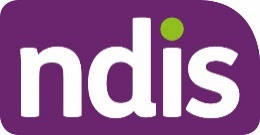 OFFICIAL: SENSIT
OFFICIAL: SENSIT
FOI 24/25-0929
IVE
What happens once you have therapy supports in your
plan?
Once you have funding for therapy supports in your plan, you can use your funding to get the
NDIS supports you need, in line with your plan. If you need help to use your funding, talk to
your my NDIS contact, support coordinator or recovery coach.
Learn more about using the NDIS funding in your plan in Our Guideline – Your plan.
You have flexibility in how you spend your therapy supports funding. For example, you can
choose if you want to spend your funding on individual or group sessions. You can choose to
spend your funding on intensive blocks of therapy or therapy at regular intervals. You can
choose which therapy or combination of therapies will be most effective in meeting your
needs at a certain time.
Your allied health professional will give us reports to show your progress towards your goals
and outcomes. This is usually when it’s time to reassess your plan. This is to make sure
you’re making progress towards the goals you set for the therapy and your skills and
independence are improving. Reports provided during a plan reassessment also help us
understand the supports you need to pursue your goals in your next plan. They also tell us if
you need to continue to receive therapy supports, what type of therapy supports you need
and what’s the outcome you want to achieve.
It’s a good idea to share your therapy strategies with your other providers and your informal
supports. This way, they can also help you with the strategies in between sessions with your
therapist.
We’ll have regular check-ins with you to make sure your therapy supports are working for
you. We’ll also discuss how they’re working during your plan reassessment meeting. This will
help us make sure your plan is meeting your individual support needs. As your capacity and
independence build, we may talk to you about changing your plan.
If you need help to use your NDIS-funded supports, talk to your my NDIS contact, support
coordinator or recovery coach. Learn more about How to start using your plan.
If your situation changes, or your NDIS-funded therapy supports are not meeting your needs,
you can ask us to change your plan.22 Learn more about Changing your plan.
What if you don’t agree with our decision?
OFFICIAL: SENSITIVE – DO NOT SHARE
OG – Therapy supports v3.0 DRAFT FOR EXTERNAL CONSULTATION 2024-12-02
Page
23
of
24
This document is correct at the date of publication.
Always visit ourguidelines.ndis.gov.au for the latest version.
Page 23 of 24
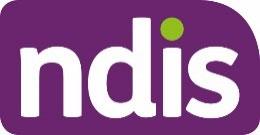 OFFICIAL: SENSIT
OFFICIAL: SENSIT
FOI 24/25-0929
IVE
If we decide therapy supports don’t meet all our NDIS funding criteria, we can’t include them
in your plan.
We’ll give you written reasons why we made the decision.23 You can contact us if you’d like
more detail about the reasons for our decision.
If you don't agree with a decision we’ve made about therapy supports, you can ask for an
internal review of our decision.24
You’ll need to ask for an internal review within 3 months of getting your plan.25
Learn more about Reviewing our decisions.
Reference list
1 NDIS Act s 34(1)(aa).
2 NDIS (Getting the NDIS Back on Track No. 1)(NDIS Supports) Transitional Rules 2024.
3 NDIS s 10.
4 NDIS (Getting the NDIS Back on Track No. 1)(NDIS Supports) Transitional Rules 2024 sch 1 item 34.
5 NDIS Act 2013 s3(d).
6 Principles to Determine the Responsibilities of the NDIS and Other Service Systems: 1 Health (3)(4).
7 Principles to Determine the Responsibilities of the NDIS and Other Service Systems: 1 Health (3)(4).
8 Principles to Determine the Responsibilities of the NDIS and Other Service Systems: 1 Health (3).
9 Principles to Determine the Responsibilities of the NDIS and Other Service Systems: 1 Health (3).
10 NDIS Act 2013 s34(1)(f); NDIS (Supports for Participants) Rules 2013 r7.1.
11 NDIS Act s 10.
12 NDIS Act s 10.
13 NDIS Pricing Arrangements and Price Limits: Therapy supports (7 or older).
14 NDIS Act 2013 s36(2)(a).
15 NDIS (Support for Participants) Rules r3.2(b).
16 NDIS Act 2013 s36(2)(a).
17 NDIS Act 2013 s36(2)(b)(i).
18 NDIS Act 2013 s34(1)(e): NDIS (Supports for Participants) Rules r3.4.
19 NDIS Act s100(1).
20 NDIS (Plan Management) Rules pt 6.
21 NDIS Act 2013 s33(3); NDIS (Getting the NDIS Back on Track No. 1)(NDIS Supports) Transitional Rules
2024.
22 NDIS Act Scheme Amendment Act 2022 s48(2).
23 NDIS Act s 100(1).
24 NDIS Act s 100.
25 NDIS Act s 100(2).
OFFICIAL: SENSITIVE – DO NOT SHARE
OG – Therapy supports v3.0 DRAFT FOR EXTERNAL CONSULTATION 2024-12-02
Page
24
of
24
This document is correct at the date of publication.
Always visit ourguidelines.ndis.gov.au for the latest version.
Page 24 of 24























